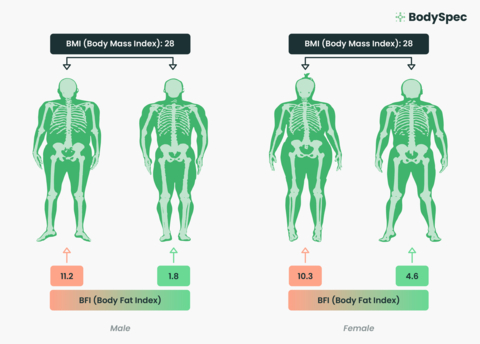BMI is out. BFI is in. Why BodySpec created a better way to measure your health.
BMI is out. BFI is in. Why BodySpec created a better way to measure your health.
It’s no secret that BMI is a flawed metric for measuring our health. It’s why BodySpec developed a new metric they’ve coined “BFI” that incorporates more than just weight and height, using hundreds of thousands of data points from their body composition scans.
AUSTIN, Texas--(BUSINESS WIRE)--BMI is widely accepted as a flawed metric for our health, yet we continue to use it in our healthcare system and media dialogue. With obesity, diabetes, and other chronic diseases at all-time highs and driving 7/10 deaths in the US, we need to do better.
BFI: A Better Measure of Health
BodySpec, the leading mobile health scanning company using DEXA technology, developed a new way to measure where we stand with our health to ultimately prevent poor outcomes as we live out our lives. Using over 200,000 real scans from our database, we show that BMI and healthy body composition are not well correlated.
BFI, where the “F” refers to Fat Mass, goes beyond simple weight and height inputs. Incorporating body fat as a variable, BFI is a better representation of our real health and the risk of developing chronic disease down the line. Our new Body Fat Index Calculator lets you calculate your own BFI.
It’s no secret that as we age, our body composition changes. Whether it’s driven by spending more time at our desks, hormonal fluctuations, childbirth, or diet changes - our lifestyles, life stage, and age, all impact our lean and fatty tissue ratios. Similarly, the diversity in our genome makes our human race beautiful. We all have different statures, and our bodies are built vastly differently. Weight alone as a measure simply does not account for these variables or diversity.
Understanding Body Fat
What you’ll see below is data from over 200,000 real body composition scans from BodySpec’s database. Looking at BMI for males as they age, for example, you would see little to be alarmed about.
In contrast, when applying BodySpec’s BFI metric to the same data set, you’ll see there are clearly concerning trends with increasing body fat levels in men as they age. This is particularly unsettling when you break down fat tissues into subcutaneous vs visceral fat - visceral fat being the dangerous fat that surrounds our organs, often referred to as “belly fat”.
This type of fat is more harmful than subcutaneous fat, which is the fat that accumulates just under the skin. Visceral fat is associated with a higher risk of several health problems, including heart disease, type 2 diabetes, and certain types of cancer. So, while a high BFI can indicate an increased risk of health problems, a high amount of visceral fat is considered even more dangerous.
GLP-1s are Leading to Muscle Loss
The hottest weight loss drugs - Ozempic, Wegovy, and Mounjaro - have been praised for their ability to help people drop weight quickly. However, many don’t realize that a significant proportion of the pounds being shed are lean muscle mass. In 2021’s STEP 1 trial – which demonstrated the efficacy of semaglutide as a treatment for adult obesity – a subset of 140 patients underwent gold-standard DEXA scans to track body composition. Among these patients, 39% of weight lost was lean mass, not fat. In another study of 178 patients from the SUSTAIN 8 trial on semaglutide, the average proportion of lean mass loss was nearly identical at 40%. When taking a drug like this, monitoring body composition with a DEXA scan is critical to ensure one is not being set up for failure by reducing muscle mass, which slows metabolism and reduces the ability to exercise, among other risks.
Why BMI is out and BFI is in:
- Body composition can be a leading indicator of risk for chronic illness.
- We are right to be skeptical of using BMI to measure our health.
- We need a simple and convenient way to measure health status more accurately than a scale.
- Body fat and lean tissue measurement are key to truly understanding our health and risk for chronic disease.
- Weight is a generic number and does not account for body composition. Athletically built men, for example, often have a high BMI, falsely indicating they are obese because of their muscle mass.
- Similarly, most people start losing weight after 65, but it is often muscle mass, meaning their body composition is deteriorating.
“We quickly realized that the data we collected could, in aggregate, add so much value to the way we measure health risks,” said Roy Shi, CEO at BodySpec. “As we reflected on how we surfaced reports to our clients, re-thinking BMI was a no-brainer starting place. Knowing that our service can play even a small part in helping people manage their risk of chronic disease is what drives us each day and is core to our mission as a company.”
You can schedule a BodySpec scan at one of their clinics across Los Angeles, San Francisco, Seattle, Dallas, or Austin to experience the service for yourself and get an accurate picture of your health.
About BodySpec
BodySpec provides health-conscious individuals with affordable, convenient, fast, and human-centered medical-grade scans. Today, their mobile van clinics visit gyms, employers, health centers, and public spaces to provide the most accurate and comprehensive full-body composition analysis available. BodySpec is working on deploying this platform to other preventative health screenings.
Contacts
Cameron Jacox
cameron_j@bodyspec.com
617-583-3401

